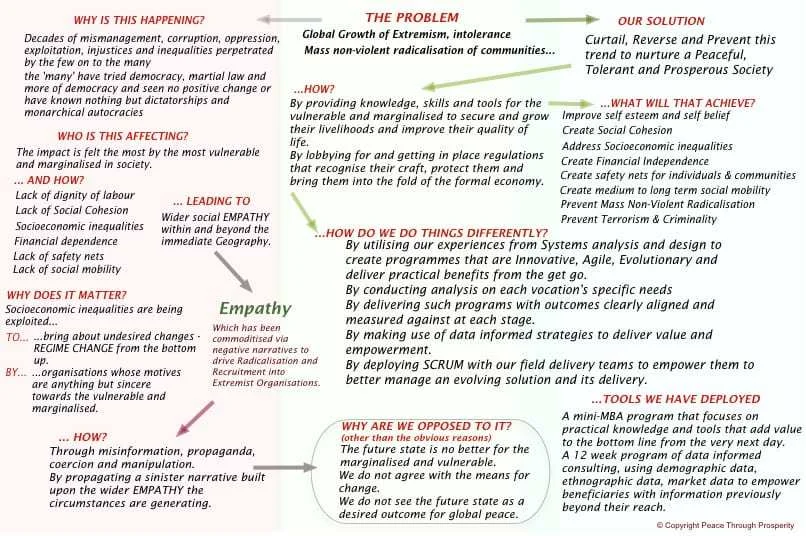Towards a better future state – part 2
Though there have been several posts by myself and on Peace Through Prosperity’s dedicated blog on the results from the ground there has been little documented by us on how we got to where we are in delivering our transformational Mini-MBA programme for micro-entrepreneurs/entrepreneurs of circumstances.
These posts focus on the process behind the system deployed; its design and implementation strategy. Our research, the process of developing the tools, methodology and techniques all with the view that such transparency will lend itself well to making the system open source and encourage others to adopted it as well as help us improve it.
In the last post I put forward the case for a ‘data informed strategy’ to influence and gently nudge the societal transformation already in process in the right direction. Hereon I shall detail how the team from Peace Through Prosperity (PTP) reached that conclusion, designed a programme to experiment with data informed consulting for micro-entrepreneurs in conflict affected regions to assist them in rebuilding their community, society starting from taking charge of their own socioeconomic circumstances.
Our journey started with a couple of simple questions; ‘…what could we do to change the current state and trajectory of affairs? …what could we do to address the growth of radicalisation in all its forms?’ that lead to ‘where and what is the silver bullet we are in search of? How would we know we have found it? How would we deliver it? What mechanisms would we need to deliver it? How do we measure its success or failure?’
Though we did not have any answers as system scientists we did have the tools and know how to discover the likely options, and we started from what we know.
We applied a number of tools and methods at our disposal from Rich pictures from Soft Systems, Scenario Planning, Story Maps, Outcomes-Based policy planning models, Persona models, Empathy maps and good old common sense; for quite some time we reviewed our models, refined, evolved, rinsed and repeated with several trips back to the field to dig deeper and validate our evolving understanding and options for solutions.
Direct, primary research in Khyber Pakhtunkhwa, South Punjab, Karachi, Morocco and London had a common thread it was elusive but we had it modelled via our tools, secondary research was affirmation of our trajectory and the conclusions we were arriving at.
From the stratosphere it was empathy; one of the key drivers, the commodity used and abused, whose dark narrative was easier to sell and even easier to conjure up. Down on the ground the pull factors giving rise to empathy were darker, murkier and firmly rooted in socioeconomic issues faced by the many in all environments from the developing to the developed.
What drives the angry young men in London’s inner estates, Karachi’s Universities and FATA’s towns and villages has a common thread that leads to displaced anger which in turn makes little work for those who pull them towards radicalisation and then on to extremism.
Our focus was on outcomes; the desired state, the detail was in harnessing empathy with a positive narrative, the secret sauce is partly in our metrics, our data informed approach and utilising results to influence behaviour, evolving and strengthening the already abundant resilience, the innovation in creating an alternative indigenous narrative for positive change.
If we could not find the Phoenix to tell its tale we had to create several to spread an alternative narrative to bring about positive change, to address and overcome the socioeconomic challenges that have starved many amongst the 99% of hope.
The means to achieving all of that and then some is the growth programme we designed, a product for positive change, we call it the ‘mini-MBA’. A data-informed practical course delivered to marginalised and vulnerable micro-entrepreneurs over 5 days, packed with practical tools and techniques designed to deliver immediate impact, backed up by data informed onsite consulting and coaching for a period of 12 weeks post class room based training, supported by influencing the environment that the micro-entrepreneurs operate in through lobbying.
Convincing the grassroots of a better way towards a brighter future and the powers that be of providing an environment that makes it possible and sustainable.
Our projects are geared towards increasing revenues, profit margins, creating financial independence, creating social cohesion, alternative power structures around trade associations, bringing dignity of labour to the down trodden, lobbying for legislations to protect the unregulated, unrecognised and untapped tax base, creating positive narratives and examples from within their communities to inspire others to see hope where they are starved of it.
Creating indigenous contextual case studies of successes based on non-material support and guidance, proving that with a bit of assistance the vulnerable and marginalised can take charge of their lives, their environment and head towards greener pastures.
The desired outcome being an environment that is conducive for individual and collective socioeconomic growth, which in turn would test our hypothesis of prosperity leading to peace.
It is all easier said than done, however we are miles into this journey, team PTP designed the product, took it to market, evolves it on a continual basis and the results over the last 18 odd months have been very encouraging for us and more so for the audience we are engaged with.
In the next post I shall share details of how we applied DSDM Atern to design the Mini-MBA program and how we are applying SCRUM and Kanban boards to deliver the program in an Agile and evolutionary manner.









